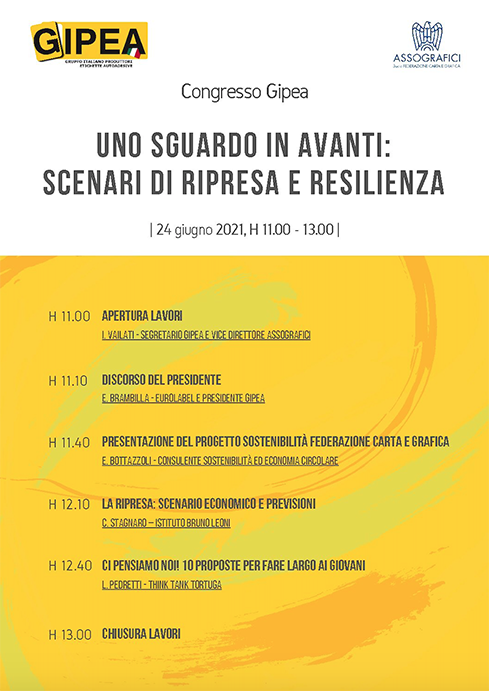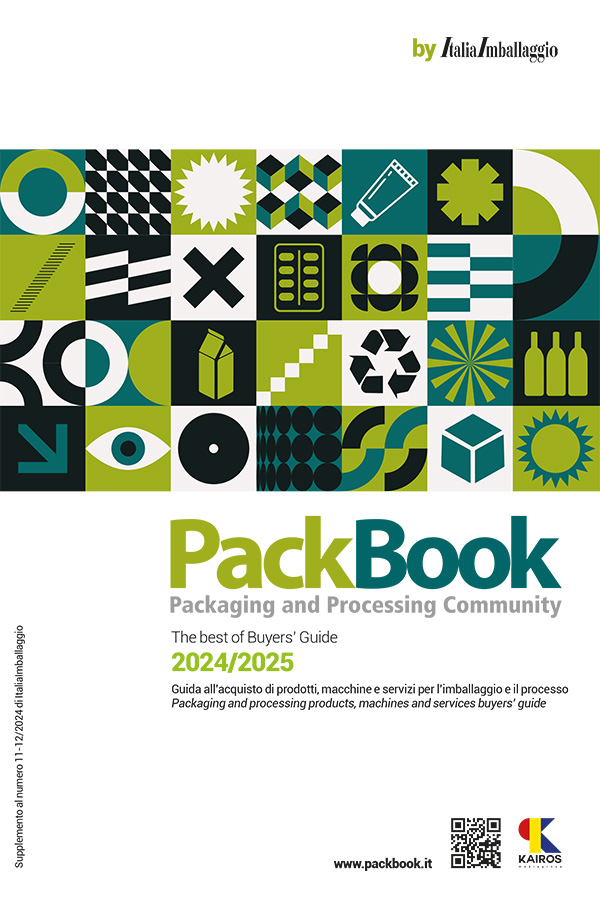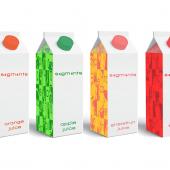Organizing the circular economy, methodically
From GIPEA Congress, June 2021.
Among the supply chain projects fielded by the Italian Paper and Graphics Federation, a concrete support to companies in the name of circular economy, to identify an organizational methodology and shared approach to sustainability issues.

Held online in June, the Gipea Congress (Gipea - Italian Group of Self-Adhesive Label Producers within Assografici that, together with Assocarta and ACIMGA, gave birth to the Italian Paper and Graphics Federation ) enabled the discussion of projects of recruitment and engagement of members and potential members, to analyze the situation of the sector at a complex time such as the post-2020 period, to talk about institutional steps and to discuss a central theme for the entire industry: sustainability.

Regarding this fundamental issue, Elisabetta Bottazzoli (consultant for circular economy) reported on the Sustainability initiative put in place by the Italian Paper and Graphics Federation, whose project she is following, in order to make it an active support for companies.
The project starts from a pragmatic approach, to overcome the abstract concept of guidelines and define a real organizational methodology and approach to corporate sustainability issues. A tool available to members, to support the process of adaptation to the standards of sustainability that, as told by the President of Gipea Elisabetta Brambilla, is alongside the many initiatives wanted by the group on the communication front, with new tools, training, courses dedicated to the use of social media and in general, the establishment of a series of associative alliances designed to strengthen the supply chain and create synergies.
Methodology for sustainability based on facts
As Bottazzoli points out, sustainability is increasingly central to the lives of companies, thanks to the spread of “certifications” that require suppliers and stakeholders to comply. In many cases, even though companies in the sector have what it takes, with equipment and qualified internal governance processes, the absence of certified and standardized processes risks losing business opportunities or leading to exclusion from important supply chains.
Qualitative and quantitative indicators must therefore respond to validation logic, according to a methodology recognized by a third party. This is the aim of the Paper and Graphics Federation, providing companies with a tool that allows them to draw up a report based on the application of a method and that is therefore recognizable to the certifying bodies to which the company turns for its sustainability reports, such as Eco Label, EMAS or ISO, just to name the best known.
A standardized software tool, but adapted to the sector
The software under development has been designed to be usable and accessible, and thanks to the building up of relationship with European institutions and the constant monitoring of regulatory developments, it has been adapted to the prospects of development in this sense, so that the path undertaken by companies is solid and with longterm prospects, capable, that is, of including future regulatory developments.
The priority is to take advantage of the opportunities offered by institutions, which are, however, stringent in terms of sustainability requirements, reporting and transparent communication of results. Proper management of these aspects is the key to accessing funding lines and initiatives from national and European institutions, to which is added, as a reinforcement, the adherence of the model to the recognized Global Reporting Initiative (GRI) - Sustainability Reporting Standard. Reporting according to international standards, in fact, allows the company to adhere to a model that is recognized both internationally and by the supply chain.

Operational support to the green transition of the sector. The objective of the Federation is therefore to provide operational support to member companies, involving the Sustainable Finance Forum and bringing together the supply chain represented by ACIMGA, Assocarta, Assografici, to give them effective tools for monitoring and reporting on environmental, social and governance performance, ready to respond to the demands of internal and external stakeholders. “United in their difference”, the Federation claim, refers not only to member companies but also to suppliers, customers and stakeholders: actors that can change significantly in characteristics and capabilities, requiring a differentiated adaptation to international standards, where context, company size, business are taken into account.
Define the methodology with participation. In the first year, the participatory process was carried out starting from an assessment, which allowed the definition of the protocol, developed in parallel with the software. The result is the positioning of the supply chains involved - Assocarta, Acimga and Assografici - on the themes of sustainability, circular economy, carbon neutrality, analyzing the regulatory context and providing parameters for reporting. These issues are increasingly present in the governance of companies, precisely because of the health emergency, which pushes consumers and companies towards virtuous conduct.
The development of the software tool is currently being finalized and will be made available to companies to encode skills, resources, and needs that will allow for the sharing of data based on a list of international and national indicators, taxonomies, and green deal points.
All these elements, isolated, rationalized and set in the context of business and sector, allow companies to join in a modulated way, based on their characteristics, making the tool a real analysis tool.
The methodology is the result of the work of three groups representing the associations, where sample companies were compared, which made it possible to “bring the project closer to the ground, making it responsive to business needs. Moreover, the companies are the protagonists in all phases, always operating in the field to test the software and validate every aspect on the operational level.
Comparable data that photograph the supply chain. Many models lack correlation with reality, but in this case, the KPIs are differentiated according to the supply chain and, consequently, to the association they belong to.
After the self-assessment, there is a progressive path based on quantitative and qualitative data, which makes it possible to define the progress of the transition to the circular economy, analyzed on xthe basis of the improvements achieved and calibrated on the real capabilities of the company. This is an important aspect that enables the construction of a database based on consistent and comparable facts, capable of uniting large and micro companies, assessed on the basis of consistent governance, economic, social and environmental data, despite the differences. The structure of the tool therefore allows for reports that can be traced back to international sustainability standards according to the Global Reporting Initiative, to help companies that are already ready on the path to improvement, without leaving behind those starting from scratch. The third party SGS is the partner that validates the methodology of software and protocol, to make it expendable and recognizable at international level.
The contribution of the Federation, finally, does not stop at the management phase, but provides a real accompaniment with a pool of experts available for the development of the financial and organizational part of the sustainability report, which thus acquires a unique logic for all members of the Federation.




















